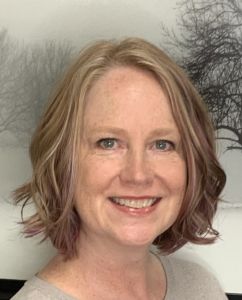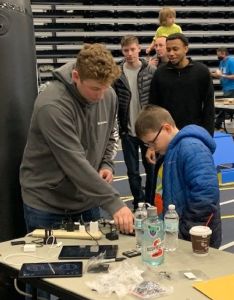
Since her days as a high school student working with researchers who had National Science Foundation (NSF) grants, Buffy Quinn had dreamed of obtaining her own grant from the federal science agency.
So, she immediately replied “Yes” in 2018 when a grant professional suggested she apply to Mentor-Connect for help with an application to NSF’s Advanced Technological Education (ATE) program. At that point she was a full-time instructor at Onondaga Community College (OCC). She began teaching at OCC after working for 20 years as a geographic information system analyst whose specialty was modeling remediation plans for Super Fund sites.
“NSF is paying me to teach me how to get more money. This is amazing. This is an opportunity I cannot pass up,” she remembers thinking about Mentor-Connect’s stipend and travel support to work with a mentor while preparing an ATE grant proposal.
Quinn attributes her 2020 ATE grant award and her 2022 promotion to assistant dean of Natural and Applied Sciences at OCC to the knowledge she gained through Mentor-Connect and the support she received from the people Mentor-Connect introduced her to in the ATE community.
Those contacts led to her participating in Working Partners, an ATE applied research project that helps faculty develop strategies to improve community college-industry partnerships. The model programs Quinn learned about through Working Partners and the plans she developed to cultivate industry support for her ATE project informed her job interview responses and are now influencing her approach to her duties as an administrator. She also recently became an assistant director and senior team member of the GeoTech Center, which is led by her Mentor-Connect Mentor Vincent A. DiNoto, Jr.
“It is not hyperbole to say that experience [becoming a Mentor-Connect mentee] has changed my life. It has completely changed the trajectory of my career,” she said.
MENTOR-CONNECT
Mentor-Connect is an ATE project based at Florence-Darlington Technical College that provides faculty-led community college teams with a mentor and technical resources for nine months while they prepare an ATE grant proposal to NSF. The American Association of Community Colleges is a Mentor-Connect partner.
Like many Mentor-Connect mentees Quinn applied to Mentor-Connect after experiencing what she calls the “heartbreak” of having an NSF grant proposal declined. But she didn’t want to abandon her dream, and recruited Justin Fiene, associate professor of biology, to work with her on a proposal for a project that integrates a credential for unmanned aerial vehicle data analysis into a geospatial science and technology degree program.
The Mentor-Connect Winter Workshop that Quinn and Fiene attended in New Orleans in 2019 was “overwhelming,” but in a good way, Quinn said. They worked face-to-face for hours with DiNoto and Ken Mays, a professor of automotive technology at Central Oregon Community College who was then a Mentor-Connect Mentor Fellow.
DiNoto asked specific questions about outcomes in ways that helped Quinn think through the activities she wanted the grant to support.

“Vince taught me how to think and write like an NSF researcher, not like a grant writer, not a proposal writer for industry, not a press release. He taught me how to think and write like an NSF person,” Quinn said. She is currently using DiNoto’s approach to assist an OCC colleague who is writing an ATE grant proposal.
Presentations by Mentor-Connect leaders at workshops and webinars during the nine-month period of Mentor-Connect’s formal mentoring helped Quinn learn NSF’s terms and processes, which were distinct from what she had known as an industry project manager. Now in the third year of her ATE project, Quinn still attends Mentor-Connect webinars – that are free and public – to stay up to date on NSF procedures.
Beyond the mentoring and technical resources, however, Quinn says interacting with the other mentors and mentees was the start of the professional network she has developed within the ATE community and that has been as important as “the nitty-gritty, one-on-one help.”
“I didn’t realize there were so many people like me who just wanted to be a part of NSF, who were dedicated to students, to their success, to getting them careers with family-sustaining wages, just wanting to sort of revamp something happening in their community colleges to help out students” she said.
At the first Mentor-Connect workshop Quinn said she “felt like all our moral compasses were all pointing in the same direction. We all had similar personal mission statements.” Quinn’s personal mission is to use GIS to help students enter high-tech careers. She said that is what majoring in geography and learning cartography skills did for her.
Working Partners
This goal influenced her decision to participate in Working Partners in 2021.
Working Partners is an ATE project led by Mary Slowinski, associate professor and chair of the Digital Media Arts Department at Bellevue College, in collaboration with the Internet Scout Research Group at the University of Wisconsin-Madison. Following a sequence of eight virtual meetings that teach two-year college teams about the strategies ATE initiatives have used to develop effective industry partnerships, participants receive guidance to develop unique action plans to meet their colleges' needs.
In addition to informing the GIS curriculum, Quinn said interacting with employers as well as students and teachers at the Public Service Leadership Academy at Fowler High School made her aware of the importance of getting into the community. She gained new appreciation for the broader impact college administrators can make.
During the interview for the assistant dean post, her Mentor-Connect experiences informed how she talked about grants and project management. Her knowledge of Working Partners’ research about model programs influenced the ideas she shared for creating a central relationship center at OCC to reach out to industry and boost the partnerships that each of the college’s associate of applied science degrees has.
New Roles
Since she became the assistant dean in June 2022, Quinn has been working with program coordinators and subject-matter experts on creating interactive career maps for the programs in OCC’s Division of Natural and Applied Sciences. The goal is to show students what courses they need for various career paths, for access points for different jobs and programs, and completion time estimates.
She also continues to work on her ATE project. However, declining college-wide enrollments mean that OCC will not build the associate degree program Quinn envisioned as a Mentor-Connect mentee. Instead, she is devising plans to teach GIS skills in “tiny little bites” for which students will receive micro credentials.
Quinn said her NSF program officer’s understanding about the modification of her project’s objectives is emblematic of the ATE community’s kindness and NSF’s flexibility when circumstances change.
During 2022-2023 her ATE project activities will serve an additional purpose as a pilot test for a State University of New York-funded project that she and OCC colleagues are working on with Cayuga Community College to develop a “campus-wide ecosystem of alternative credentialing.” Quinn hopes the alternative system will allow students to obtain credit for workforce courses and even briefer programs to stack toward degrees.
“With our declining enrollment, we’ve got to get more clever and more sort of proactive about bringing students in,” she said, adding that this includes exposing enrolled students to STEM programs through technology demonstrations.
Ever the doer, Quinn plans to use data about this test of micro-credentialing for her doctoral dissertation.
This year she has also became an assistant director and senior team member of the GeoTech Center that DiNoto, her Mentor-Connect mentor, leads. Her focus will be the center’s professional development programs, particularly its annual GeoEd Conference, Virtual GIS Conference, and Earth Observation Day.
DiNoto anticipates that her high energy and commitment – which comes through in even casual conversations with Quinn – and her unique blend of industry experience and classroom teaching will help GeoTech.
“The thing Buffy brings to every experience is that enthusiasm,” DiNoto said.

 Subscribe
Subscribe


 See More ATE Impacts
See More ATE Impacts

Comments
There are no comments yet for this entry. Please Log In to post one.